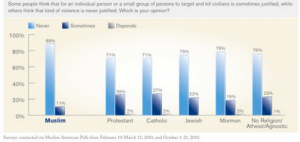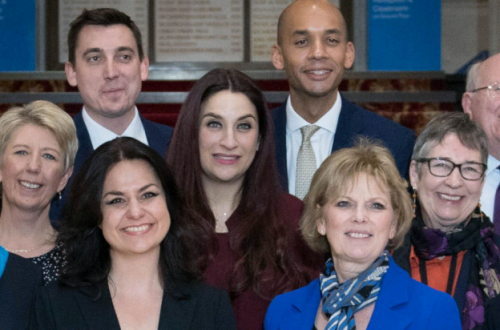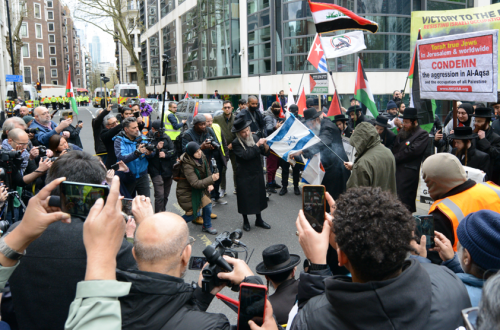First up, a crisply argued post by Steven Lubet which pins down the vital distinction between ‘morally wrong’ and ‘morally responsible’:
Blaming her, even partially and conditionally, for an act of terror stretches moral reasoning beyond the breaking point … The implication here is staggering. In the wake of threats of murder for the exercise of free expression—and lately, they have been much more than threats—Feldman claims that the correct moral response is to shut up. In this contest, the bullies always win, so long as their violent reaction is sufficiently predictable—which, as Feldman does not acknowledge, gives the bullies a strong incentive to strike early and often (thus making their threats more credible).
…
Feldman attempts to draw a fine line between risking violence (which is apparently okay) and seeking it (which is morally blameworthy). He asserts that Geller falls into the latter category because “she paid for an armed security guard outside the event, suggesting she considered violence at least possible” and because “cartoons perceived as insulting the prophet have been met with violence” in the past. By that measure, we would also have to blame the victims at Charlie Hebdo, as well as those who were murdered the following month at a “blasphemy debate” in Copenhagen. After all, they too had armed guards.
Do read the whole piece – even if you don’t agree with his take on Geller.
Whereas Geller seems to view Islam through bile-tinted spectacles, Craig Considine’s view of the religion is decidedly rosy. However in this piece he does acknowledge that some Muslims, as well as non-Muslims, respond unsympathetically to his championing of Islam against views he perceives as bigoted.
Studying Islam has come at a price. Old friends see me as a traitor; family members see me as “strange,” and Muslims see me as someone who will never be good enough.
If anyone happened to reflect (with reference to Considine’s title) that there may be a rather greater price to pay for disrespecting Islam then this piece, on the ‘Nice Mangos’ blog, may strike a chord. It’s a clear-sighted and honest perspective on growing up as a Muslim, and the writer gives a fascinating account of how her views evolved over time. There was lots I wanted to quote here – do read it in full:
As I tried to make sense of my own conflicted feelings on the matter of ‘ridiculing’ what others hold sacred… I read up, untangled the knots…the excuses and apologia unraveled automatically. I threw my relativism out the window, and realized that intolerance should never be tolerated.
That’s basically what the opposition of free speech is – an intolerance for opposing ideas. Even if ideas are loathsome we must allow them room to exist. We can choose not to promote those ideas or participate in their perpetuation, we can frown upon them…but we should acknowledge their right to be.
…
One thing I never did was turn away from facts or evidence, deny or misrepresent things deliberately to make my point (as is the case with people who scream about Charlie Hebdo being racist). If someone presented me with evidence contradicting my own opinions, I looked into it and was happy to admit I was wrong. Perhaps why my apologist phase didn’t last too long.
I read this article by Rabia Chaudry before turning to the Hirsi Ali piece which prompted it. Choudry thinks that Hirsi Ali fails to grasp American values:
In America, even fundamentalist speech is protected by the First Amendment—we don’t have thought or religious police here. As long as you’re not hurting anyone, you’re actually legally allowed to be as religiously strict as you please. You can dress in religious garments, eat religiously mandated foods, erect your own houses of worship and private schools, have as many babies as you think God wants you to have, proselytize to others, and expect your employers to accommodate your practices of belief.
Because America is a free society it allows people to hold and promote views which many find deplorable. The fact that these views are legal doesn’t make them off limits to criticism.
There are two ways in which some people try to muddy the waters over freedom and offence.
The first is to pit ‘free speech’ against ‘hate speech’ (or simply unwelcome speech), as though the two were totally distinct. But obviously unpleasant speech is a subset of free speech, not something (as wrongly implied by the ‘hate speech is not free speech’ formula) completely separate.
The second is a kind of mirror image of this – to argue that any criticism of an instance of free speech/action is an attack on freedom. This is Choudry’s line in her response to Geller, but the same argument is used by Geller’s supporters as well. It’s perfectly possible to criticise either the world view of Geller or conservative religious teachings without wishing to repress such views.
Another problem with Chaudry’s article is that she cites examples of Islamic behaviour – dress and food – which most people are happy enough to accept, but fails to engage with the more challenging elements in Hirsi Ali’s article:
Approximately two fifths of Muslim immigrants between now and 2030 will be from just three countries: Pakistan, Bangladesh, and Iraq. Another Pew study – of opinion in the Muslim world – shows just how many people in these countries hold views that most Americans would regard as extreme. (Data on opinion are unavailable for the other two big “sender” countries, Somalia and Iran.)
Three quarters of Pakistanis and more than two fifths of Bangladeshis and Iraqis think that those, like me, who leave Islam should suffer the death penalty. More than 80 percent of Pakistanis and two thirds of Bangladeshis and Iraqis regard sharia law as the revealed word of God. Only tiny fractions would be comfortable if their daughters married Christians. Only a minority regards honor killings of women as never justified. A quarter of Bangladeshis and one in eight Pakistanis think that suicide bombings in defense of Islam are often or sometimes justified.
There’s some interesting data which Choudry could have used to counter, at least in part, Hirsi Ali’s concerns. Although it’s an annoying article in some respects, I can quite see why, back in 2011, Danios was keen to flag the results of a poll on the views of different religious groups in America towards the killing of civilians.
Later in the article Hirsi Ali points out that:
Indeed, half say they think of themselves first as a Muslim, second as American, despite the fact that 81% of those polled were U.S. citizens.
Some of the views held by Muslims – to a much greater or much lesser extent depending on country – are a genuine cause for concern. Obvious examples are support for earthly penalties for apostasy, blasphemy and homosexuality. But with some issues it’s important to be able to compare Muslim responses with the views of other religious groups. This issue of dual loyalties is a case in point. According to a 2007 poll US Christians are more likely than US Muslims to place their faith identity above their national identity.
Most American Christians think of themselves as Christians first, then Americans, according to a 2007 poll by CNN.
The survey said 59 percent identify themselves primarily by their faith, while 36 percent of believers described themselves as Americans first, Christians second.
The results invited comparisons with a similar poll of American Muslim attitudes conducted this year. A Pew Research Center poll showed 47 percent of Muslims in America said they are Muslim first, American second. (In England, polls show 81 percent said they are Muslims first. In Germany, 66 percent said they are Muslim first.)
With younger American Muslims, the sentiments were reversed: 60 percent said they were Muslim first.



